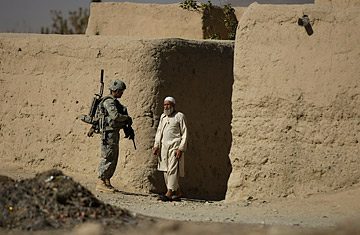
A U.S. Army soldier from the 1st Battalion, 502nd Infantry Regiment, 101st Airborne Division, speaks to an Afghan man in West Now Ruzi village in Afghanistan's Kandahar province
The game has changed in Afghanistan since President Obama last year laid out his plan to tame the Taliban and start withdrawing troops. While U.S. military officials boast of significant gains in the militants' southern strongholds in recent months thanks in large part to the President's troop surge, they caution that it won't be possible to fully gauge the impact until fighting picks up again in the spring. And even in the best-case scenario, it will still take at least four more years to complete a full handover to Afghan security forces. So as the Obama Administration this week undertakes the review of Afghan strategy promised 12 months ago, the White House — in deference to the military's view that more time is needed — has signaled that no major changes are under consideration. This week's assessment of the state of the war in Afghanistan has become little more than a formality. "[The review] is definitely not as significant as it was, which is good for the Department of Defense," says a senior U.S. officer serving in Afghanistan.
The writing has been on the wall for months. When the President told West Point cadets last December that he was deploying 30,000 extra troops to the conflict, he made clear that he believed he was raising the force level in order to create conditions to hasten U.S. withdrawal. But shortly after the speech, Administration and military officials began to downplay the July 2011 date Obama had named for the beginning of that drawdown.
Military officers warned that incoming reinforcements would not have enough time to post results. Then came the replacement of General Stanley McChrystal by General David Petraeus in midsummer. Major operations planned for Kandahar and Helmand provinces kicked into gear later than originally planned. And military sources say that Petraeus, the architect of the Iraq surge whose reputation was then on the line, insisted that a longer time frame was essential for counterinsurgency to achieve lasting results. It had become an open secret that the July 2011 date no longer had any significance by the time it was announced, at last month's NATO conference in Lisbon, that the target date for handing security control to Afghan forces is now the end of 2014.
So given the extension of the mission's deadline, what is the point of this week's review? A U.S. military officer with close knowledge of its contents suggests that it remains important, because "we are tweaking our strategy around the margins." Much of this year's thrust was in the south, but insurgents have fought fiercely in the eastern borderlands, from which they've had some success in advancing deeper into the center of the country. Violence is also worse in the north, a widening front in the war where security had long been taken for granted. Details are scarce, but the officer says these developments could yield a small-scale redeployment of existing troops. And the mass displacement of Afghans in the southern war zone might prompt skeptics of the surge in other U.S. government agencies to question military tactics and push for greater civilian involvement to consolidate security in volatile areas. Then there's Pakistan, which receives billions in U.S. military aid to crack down on militants but still offers safe haven to insurgents inside its borders. "How," the officer asks, "can we continue to best influence their strategic calculus?"
On the Afghan street, meanwhile, many complain that the focus on security needs and the need to field local forces to fight the Taliban has come at the expense of focusing on corruption, one of the primary drivers of the insurgency. Sanjar Sohail, the editor of a prominent daily newspaper in Kabul, points out that although documents revealed by WikiLeaks reveal a deep concern among State Department officials over graft and foul play within the Hamid Karzai administration, that hasn't resulted in decisive action to confront the problem. "People here think that international troops have brought this government to power and support it, and at the same time close their eyes to the bad activities of their Afghan partners," he says, urging that examples be made of corrupt officials and more resources devoted to improving basic services and a broken justice system.
But these failures, and the toll of nine years of war, have eroded the Afghan public's support for the ongoing counterinsurgency effort — and their backing is far more critical than troops and firepower are to its prospects for success. A new poll by Western news outlets finds that 55% of Afghans want Western forces to leave the country as soon as possible. Only 36% said they trusted foreign troops to protect them, a figure that's easily understood due to mounting civilian casualties from raids and air strikes. Although the Taliban are still responsible for the vast majority of innocent deaths, Afghans polled said they expect more from coalition forces endowed with modern technologies who profess to be fighting on their behalf. Indeed, despite the enduring antipathy toward the Taliban — just 9% of people said they prefer them to the current regime — nearly three-quarters of respondents said it was time to end the war by negotiating with the insurgents.
But the U.S.-led coalition is now locked into four more years in Afghanistan, perhaps more. As General Petraeus reiterated in an interview last week, although Afghan troops will take over from coalition forces in select areas beginning next year, 2014 is just a goal. Yet American — and Afghan — war fatigue is likely to grow as military operations continue next year and casualties mount. In the end, more time and resources may not amount to a winning proposition in the longest war in America's history.
